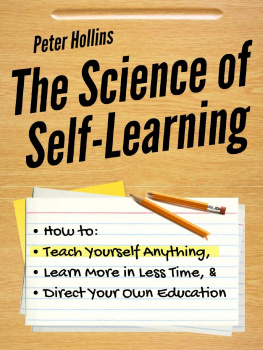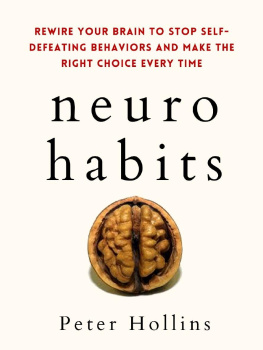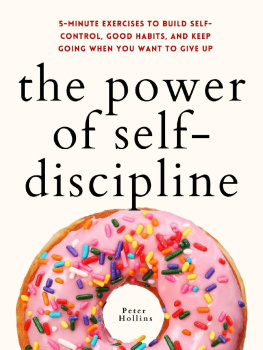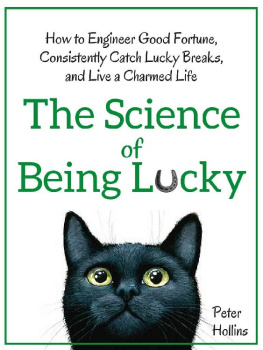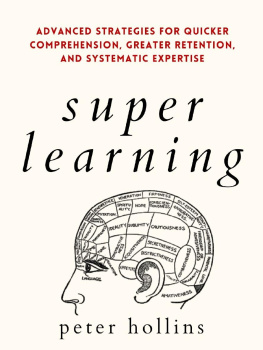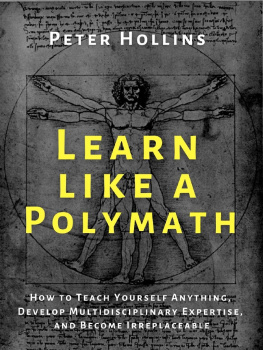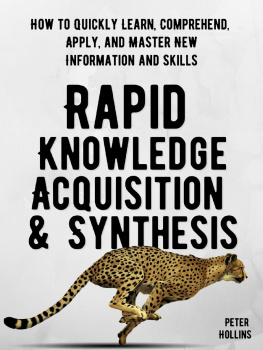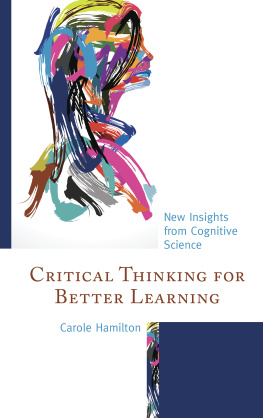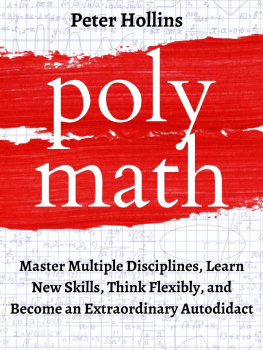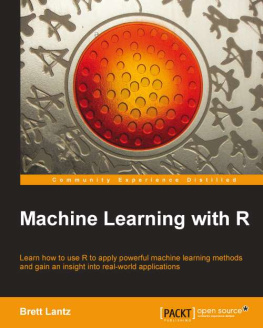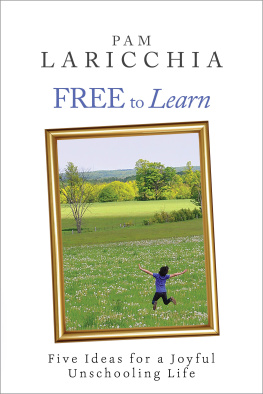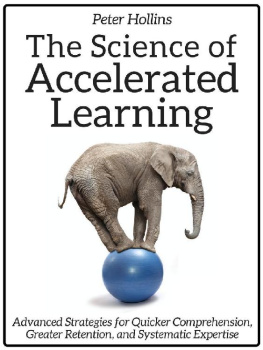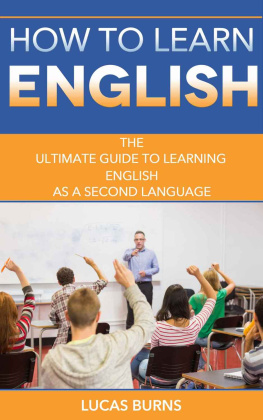Table of Contents
The Science of Self-Learning: How to Teach Yourself Anything, Learn More in Less Time, and Direct Your Own Education
By Peter Hollins,
Author and Researcher at petehollins.com
Click for your FREE Human Nature Cheat Sheet: 7 Surprising Psychology Studies That Will Change The Way You Think.
Table of Contents
Table of Contents
Chapter 1. Principles of Self-Learning
Chapter 2. Interaction with Information
Chapter 3. Read Faster and Retain More
Chapter 4. Skills and Habits to Teach Yourself Anything
Summary Guide
Chapter 1. Principles of Self-Learning
Most of usor at least our parentsrecall how education used to be in the 20th century, before technology made acquiring information super easy. We learned in institutionalized settings: the classroom, the laboratory, the workshop, and out in the field. We might have learned additional skills at trade schools or night classes. If you wanted to learn something, it required a lot of effort. Consider that encyclopedias used to be popular and widespreadbecause there was literally no other way of looking up information or learning by yourself. It almost feels like the dark ages when you realize how difficult it was to simply acquire knowledge and learn about what youre interested in.
In all of those stuffy traditional environments, someone else decided what we should learn beforehand, whether it was a school board, a private instructor, or family. Learning conferred a top-down relationship with someone else who had the knowledge we sought. Self-learningin most, but not all, areaswasnt considered as legitimate as getting an education from a known or accredited source. To enter professions or be considered in any positive light, you must have gone through the proper channels and received the pertinent pieces of paper that told people you were knowledgeable. Gatekeepers were everywhere and designed to keep you from rising.
The 21st century has changed all that, thank goodness. Self-education is a thriving industry. Students direct their own learning in topics that used to only be covered in college settings, and far beyond of course. The Internet has opened up broad avenues of information access that are available to anyone with a connection. Somebody who truly wants to learn facts in history, science, the arts, business, technology, or literature can do so with at least a little comprehensiveness through online sources.
Students can supplement their traditional studies, or they can create their own curriculums designed to get them where they want to be. The business titans we worship these days dont even have the degrees that used to be required.
Still, self-education can seem like a grand undertaking. Indeed, it involves a higher personal drive and commitment than we had in our regimented school days because were guiding ourselves when we self-learn. Were motivating ourselves. Were often learning in a vacuum, trying to derive meaning and knowledge in subjects that are totally new to us. And well frequently doubt whether were doing it right.
This book aims to ease some of those problems and help you become a dedicated, determined, and agile self-learner in whatever discipline you choose. It will take you through the steps of finding your inspiration to learn, planning, developing positive habits, and driving your own education. Its my hope that you can use the skills and reasoning this book provides for any course youre interested inand, hopefully, it will encourage you to find more subjects to learn about.
Self-learning benefits from a mindset that isnt always picked up in traditional institutions, but that can prove to be a major advantage in more than just education. Thats the mindset of the autodidact.
An autodidact is, most simply put, a self-educator. Its what youre probably aspiring to. They own the entire method of their instruction, from beginning to finish, from interest to implementation. Theyre hungry to learn more about the topics theyre most passionate about, and theyre enthusiastic about learning new subjects from scratch. They manage all the tools they need to learn: books, videos, podcasts, online courses, and even fieldwork. An autodidact is comfortable with the notion that theyre both teacher and student, often at the same time.
Anyone can be an autodidactthere arent any restrictions on age, gender, or background. All thats required is the willingness to actively find new knowledge and to do so with a discerning, evaluative mind. The autodidact is driven by a strong desire to acquire intelligence and is most successful when they make a concentrated and well-plotted endeavor to do so. An autodidact is especially effective if they have a strong memory and can direct their own study outside of formal education settings.
This is a skill to be cultivated. Its not easy, especially at first, but this mindset is how to take your self-learning to the next level. Its how you are able to immerse yourself in new knowledge and reach expert levels, even if you have to drag yourself through it.
Traditional Learning vs. Self-Learning
All of us have some experience in institutionalized learning, and its important that we do. Some of us may have had good experiences in high school and college; some of us might have struggled. We all needed to go through traditional school because it laid the groundwork for our adult lives, whether we were star students or rebels.
That said, there are some elements of traditional education that could be considered impediments to true learning. These elements arent always negative, and their being obstacles has a lot to do with the student. But several well-respected, learned individualsincluding Mark Twain and Albert Einstein, both legendary autodidactshave expressed skepticism about the limits of traditional education. While their criticisms arent always true across the board, theyre definitely valid in certain cases, and theyre legitimate arguments in favor of self-education.
Its psychologically restrictive. In a traditional education setting, youre expected to always be attentive and on point. Most if not all of your mental resources need to be applied toward the topics youre studying, to the extent that grabbing just a few reasonable minutes of free time could make one feel guilty or irresponsible. How can you enjoy the rare two-hour movie when youve got a chemistry final breathing down your neck? This is one of the many problems with a one-size-fits-all approach.
It often uses fear as a motivator. If you dont study hard and achieve success according to the standards of your school or university, supposedly youll have no future. Beginning when were children, were told that if we dont follow the demands of traditional schoolingif we dont keep our heads down for 18 years, plug away, and get that degreethen well wind up destitute, unsuccessful, and live a terrible life out on the fringes of society.
The problem with using fear as a motivator is that it flat-out doesnt workwell explain why in a bit. Sure, children might not understand motivation in many other ways, but there are indeed other ways.
It limits or even destroys creativity. In school, you do as youre told. You dont have any leeway. Your course of study is chosen for you. Your texts are assigned. Your materials, lab experiments, and resources all come from prepared lists from which you cant deviate. There is only one answer. Most of the time, there is only one method as well. Youre told to approach problems and questions in certain, specific, and fixed manners. Even if you can better understand a concept through creative thinking and self-driven investigations, youre expected to conform. The compounding frustration, as it turns out, either turns you off the subject or doesnt teach you anything at all, usually both.

